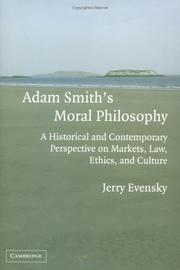| Listing 1 - 10 of 12 | << page >> |
Sort by
|
Book
Year: 2021 Publisher: Project Gutenberg
Abstract | Keywords | Export | Availability | Bookmark
Book
Book
ISBN: 080479300X 9780804793001 9780804791946 0804791945 9780804792943 0804792941 Year: 2014 Publisher: Stanford, California
Abstract | Keywords | Export | Availability | Bookmark
 Loading...
Loading...Choose an application
- Reference Manager
- EndNote
- RefWorks (Direct export to RefWorks)
The Other Adam Smith represents the next wave of critical thinking about the still under-examined work of this paradigmatic Enlightenment thinker. Not simply another book about Adam Smith, it allows and even necessitates his inclusion in the realm of theory in the broadest sense. Moving beyond his usual economic and moral philosophical texts, Mike Hill and Warren Montag take seriously Smith's entire corpus, his writing on knowledge, affect, sociability and government, and political economy, as constituting a comprehensive-though highly contestable-system of thought. We meet not just Smith the
Philosophy, Modern. --- Smith, Adam, -- 1723-1790. --- Philosophy, Modern --- Philosophy & Religion --- Philosophy --- Modern philosophy --- Smith, Adam, --- E-books

ISBN: 0521852471 0521703867 1107154391 9786611113162 0511344961 0511344600 0511568231 0511610645 1281113166 051134421X 0511345305 9780521852470 9780521703864 Year: 2005 Publisher: Cambridge Cambridge University Press
Abstract | Keywords | Export | Availability | Bookmark
 Loading...
Loading...Choose an application
- Reference Manager
- EndNote
- RefWorks (Direct export to RefWorks)
Adam Smith is the best known among economists for his book, The Wealth of Nations, often viewed as the keystone of modern economic thought. For many he has become associated with a quasi-libertarian laissez-faire philosophy. Others, often heterodox economists and social philosophers, on the contrary, focus on Smith's Theory of Moral Sentiments, and explore his moral theory. There has been a long debate about the relationship or lack thereof between these, his two great works. This work treats these dimensions of Smith's work as elements in a seamless moral philosophical vision, demonstrating the integrated nature of these works and Smith's other writings. This book weaves Smith into a constructive critique of modern economic analysis (engaging along the way the work of Nobel Laureates Gary Becker, Amarty Sen, Douglass North, and James Buchanan) and builds bridges between that discourse and the other social sciences.
Smith, Adam --- Economics --- Ethics --- Teleology --- Equality --- Moral and ethical aspects --- Smith, Adam, --- Criticism and interpretation --- Business, Economy and Management --- Economics - Moral and ethical aspects --- Smith, Adam, - 1723-1790 --- Smith, Adam, - 1723-1790 - Criticism and interpretation --- Smith, Adam, - 1723-1790. - Inquiry into the nature and causes of the wealth of nations --- Smith, Adam, - 1723-1790. - Theory of moral sentiments --- Ethics. --- Teleology. --- Equality. --- Moral and ethical aspects. --- Egalitarianism --- Inequality --- Social equality --- Social inequality --- Political science --- Sociology --- Democracy --- Liberty --- Design in natural phenomena, Study of --- Final cause --- Philosophy --- Causation --- Evolution --- Necessity (Philosophy) --- Deontology --- Ethics, Primitive --- Ethology --- Moral philosophy --- Morality --- Morals --- Philosophy, Moral --- Science, Moral --- Values --- Economic theory --- Political economy --- Social sciences --- Economic man --- Criticism and interpretation.

ISBN: 069112390X 0691115028 1282158368 1400826055 9786612158360 9781400826056 9780691115023 9780691123905 6612158360 9781282158368 Year: 2004 Publisher: Princeton, N.J. : Princeton University Press,
Abstract | Keywords | Export | Availability | Bookmark
 Loading...
Loading...Choose an application
- Reference Manager
- EndNote
- RefWorks (Direct export to RefWorks)
Adam Smith was a philosopher before he ever wrote about economics, yet until now there has never been a philosophical commentary on the Wealth of Nations. Samuel Fleischacker suggests that Smith's vastly influential treatise on economics can be better understood if placed in the light of his epistemology, philosophy of science, and moral theory. He lays out the relevance of these aspects of Smith's thought to specific themes in the Wealth of Nations, arguing, among other things, that Smith regards social science as an extension of common sense rather than as a discipline to be approached mathematically, that he has moral as well as pragmatic reasons for approving of capitalism, and that he has an unusually strong belief in human equality that leads him to anticipate, if not quite endorse, the modern doctrine of distributive justice. Fleischacker also places Smith's views in relation to the work of his contemporaries, especially his teacher Francis Hutcheson and friend David Hume, and draws out consequences of Smith's thought for present-day political and philosophical debates. The Companion is divided into five general sections, which can be read independently of one another. It contains an index that points to commentary on specific passages in Wealth of Nations. Written in an approachable style befitting Smith's own clear yet finely honed rhetoric, it is intended for professional philosophers and political economists as well as those coming to Smith for the first time.
AA / International- internationaal --- 330.44 --- Adam Smith. --- Ethics. --- Economics --- Deontology --- Ethics, Primitive --- Ethology --- Moral philosophy --- Morality --- Morals --- Philosophy, Moral --- Science, Moral --- Philosophy --- Values --- Philosophy. --- Smith, Adam, --- Ethics --- Smith, Adam --- Adam Smith --- Economics - Philosophy --- Smith, Adam, - 1723-1790

ISBN: 9780521449298 0521449294 9780511581212 9780521188234 0511581211 9780511580895 0511580894 9780511580574 0511580576 0521188237 1107189071 0511698623 1282302736 9786612302732 0511579454 0511578717 0511580193 Year: 2009 Publisher: Cambridge Cambridge university press
Abstract | Keywords | Export | Availability | Bookmark
 Loading...
Loading...Choose an application
- Reference Manager
- EndNote
- RefWorks (Direct export to RefWorks)
This book revisits the moral and political philosophy of Adam Smith, capitalism's founding father, to recover his understanding of morality in a market age.
Smith, Adam --- Virtue. --- Ethics, Modern --- Vertus --- Morale moderne --- Smith, Adam, --- Virtue --- Conduct of life --- Ethics --- Human acts --- Arts and Humanities --- History --- E-books --- Smith, Adam (1723-1790) --- Libéralisme économique --- Vertu --- Critique et interprétation --- Aspect moral --- Libéralisme économique --- Critique et interprétation
Book
ISBN: 0748623523 9780748623525 9786610538447 0748672117 1280538449 0748627057 0748623531 9780748627059 9780748623532 9781280538445 Year: 2006 Publisher: Edinburgh Edinburgh University Press
Abstract | Keywords | Export | Availability | Bookmark
 Loading...
Loading...Choose an application
- Reference Manager
- EndNote
- RefWorks (Direct export to RefWorks)
Aims to show that Adam Smith (1723-90), the author of "The Wealth of Nations", was not the promoter of ruthless laissez-faire capitalism that is frequently depicted. Smith's "right-wing" reputation was sealed after his death when it was not safe to claim that an author may have influenced the French revolutionaries.
Economic schools --- Smith, Adam --- Smith, Adam,-- 1723-1790-- Influence. --- Business. --- Economics --- Enlightenment --- Business & Economics --- Economic Theory --- Philosophy --- Smith, Adam, --- Influence. --- -Enlightenment --- -330.153092 --- Aufklärung --- Eighteenth century --- Philosophy, Modern --- Rationalism --- Economic theory --- Political economy --- Social sciences --- Economic man --- Smit, Adam, --- Yadang Simi, --- Ya-tang Ssu-mi, --- 亚当・斯密, --- Simi, Yadang, --- Ssu-mi, Ya-tang, --- 斯密亚当, --- סמית, אדם, --- スミスアダムス, --- Philosophy.

ISBN: 0691004463 9786612753664 1282753665 1400822947 9781400822942 9780691004464 Year: 1999 Publisher: Princeton (N.J.): Princeton university press
Abstract | Keywords | Export | Availability | Bookmark
 Loading...
Loading...Choose an application
- Reference Manager
- EndNote
- RefWorks (Direct export to RefWorks)
Taking the title of his book from Isaiah Berlin's famous essay distinguishing a negative concept of liberty connoting lack of interference by others from a positive concept involving participation in the political realm, Samuel Fleischacker explores a third definition of liberty that lies between the first two. In Fleischacker's view, Kant and Adam Smith think of liberty as a matter of acting on our capacity for judgment, thereby differing both from those who tie it to the satisfaction of our desires and those who translate it as action in accordance with reason or "will." Integrating the thought of Kant and Smith, and developing his own stand through readings of the Critique of Judgment and The Wealth of Nations, Fleischacker shows how different acting on one's best judgment is from acting on one's desires--how, in particular, good judgment, as opposed to mere desire, can flourish only in favorable social and political conditions. At the same time, exercising judgment is something every individual must do for him- or herself, hence not something that philosophers and politicians who reason better than the rest of us can do in our stead. For this reason advocates of a liberty based on judgment are likely to be more concerned than are libertarians to make sure that government provides people with conditions for the use of their liberty--for example, excellent standards of education, health care, and unemployment insurance--while at the same time promoting a less paternalistic view of government than most of the movements associated for the past thirty years with the political left.
Judgment (Ethics) --- Liberty --- Kant, Immanuel, --- Smith, Adam, --- Contributions in political science --- Judgment (Ethics). --- Kant, Immanuel, 1724-1804 -- Contributions in political science. --- Liberty. --- Smith, Adam, 1723-1790. --- Political Theory of the State --- Political Science --- Law, Politics & Government --- Moral judgment --- Civil liberty --- Emancipation --- Freedom --- Liberation --- Personal liberty --- Kant, Immanuel --- -Smith, Adam --- Ethics --- Democracy --- Natural law --- Political science --- Equality --- Libertarianism --- Social control --- Kant, Emmanuel --- Kant, Emanuel --- Kant, Emanuele --- Smith, Adam --- Kant, I. --- Kānt, ʻAmmānūʼīl, --- Kant, Immanouel, --- Kant, Immanuil, --- Kʻantʻŭ, --- Kant, --- Kant, Emmanuel, --- Ḳanṭ, ʻImanuʼel, --- Kant, E., --- Kant, Emanuel, --- Cantơ, I., --- Kant, Emanuele, --- Kant, Im. --- קאנט --- קאנט, א. --- קאנט, עמנואל --- קאנט, עמנואל, --- קאנט, ע. --- קנט --- קנט, עמנואל --- קנט, עמנואל, --- كانت ، ايمانوئل --- كنت، إمانويل، --- カントイマニユエル, --- Kangde, --- 康德, --- Kanṭ, Īmānwīl, --- كانط، إيمانويل --- Kant, Manuel, --- Kant, Immanuel, - 1724-1804 - Contributions in political science --- Smith, Adam, - 1723-1790 --- Kant, Immanuel, - 1724-1804 --- Contributions in political science.

ISBN: 1134235879 1280291591 9786610291595 0203008480 9780203008485 9780415360944 0415360943 9781134235872 9781280291593 6610291594 9781134235827 9781134235865 9780415845847 1134235860 Year: 2006 Volume: 42 Publisher: London New York Routledge
Abstract | Keywords | Export | Availability | Bookmark
 Loading...
Loading...Choose an application
- Reference Manager
- EndNote
- RefWorks (Direct export to RefWorks)
When Adam Smith published his celebrated writings on economics and moral philosophy he famously referred to the operation of an 'invisible hand'. Adam Smith's Political Philosophy makes visible this hand by examining its significance in Smith's political philosophy and relating it to similar concepts used by other philosophers, thus revealing a distinctive approach to social theory that stresses the importance of the unintended consequences of human action.The first book to examine the history of Smith's political philosophy from this perspective, this work introduces greater concept
Economics. --- Liberalism. --- Political ethics. --- Self-organizing systems. --- Learning systems (Automatic control) --- Self-optimizing systems --- Cybernetics --- Intellect --- Learning ability --- Synergetics --- Ethics, Political --- Ethics in government --- Government ethics --- Political science --- Politics, Practical --- Ethics --- Civics --- Liberal egalitarianism --- Liberty --- Social sciences --- Economic theory --- Political economy --- Economic man --- Moral and ethical aspects --- Smith, Adam, --- Social theory. --- Liberalism --- Political ethics --- Economics --- Self-organizing systems --- Smith, Adam, - 1723-1790 --- Critique et interprétation
Book
ISBN: 1137590475 1137584122 1349552895 Year: 2016 Publisher: New York : Palgrave Macmillan US : Imprint: Palgrave Macmillan,
Abstract | Keywords | Export | Availability | Bookmark
 Loading...
Loading...Choose an application
- Reference Manager
- EndNote
- RefWorks (Direct export to RefWorks)
This book examines Adam Smith’s main principles in Wealth of Nations as the basis for effective policymaking. Adam Smith wanted to increase happiness through this formula for a good life: equality, liberty, and justice. Free market interpretations of Smith, the book argues, grossly misrepresent his thought, emphasizing only liberty and not also equality and justice. This book suggests policies that combine all three in order for happiness to be maximized.
Political theory. --- Economics --- History. --- Political economy. --- Political science --- Public policy. --- Political Theory. --- International Political Economy. --- Political Philosophy. --- Public Policy. --- Political philosophy --- Economic theory --- Political economy --- Social sciences --- Economic man --- Administration --- Civil government --- Commonwealth, The --- Government --- Political theory --- Political thought --- Politics --- Science, Political --- State, The --- Philosophy. --- Political philosophy. --- Smith, Adam, --- Smith, Adam --- Political and social views. --- Smit, Adam --- Smith, Adamo --- Yadan Simi --- 亞丹斯密 --- Philosoph --- Hochschullehrer --- Volkswirt --- Wirtschaftswissenschaftler --- Kirkcaldy --- Edinburgh --- Hume, David --- 1723-1790 --- 05.06.1723-17.07.1790 --- Simi, Yadang, --- Smit, Adam, --- Ssu-mi, Ya-tang, --- Ya-tang Ssu-mi, --- Yadang Simi, --- Political science. --- International economic relations. --- Political planning. --- International Political Economy’. --- Planning in politics --- Public policy --- Planning --- Policy sciences --- Politics, Practical --- Public administration --- Economic policy, Foreign --- Economic relations, Foreign --- Economics, International --- Foreign economic policy --- Foreign economic relations --- Interdependence of nations --- International economic policy --- International economics --- New international economic order --- Economic policy --- International relations --- Economic sanctions
| Listing 1 - 10 of 12 | << page >> |
Sort by
|

 Search
Search Feedback
Feedback About UniCat
About UniCat  Help
Help News
News